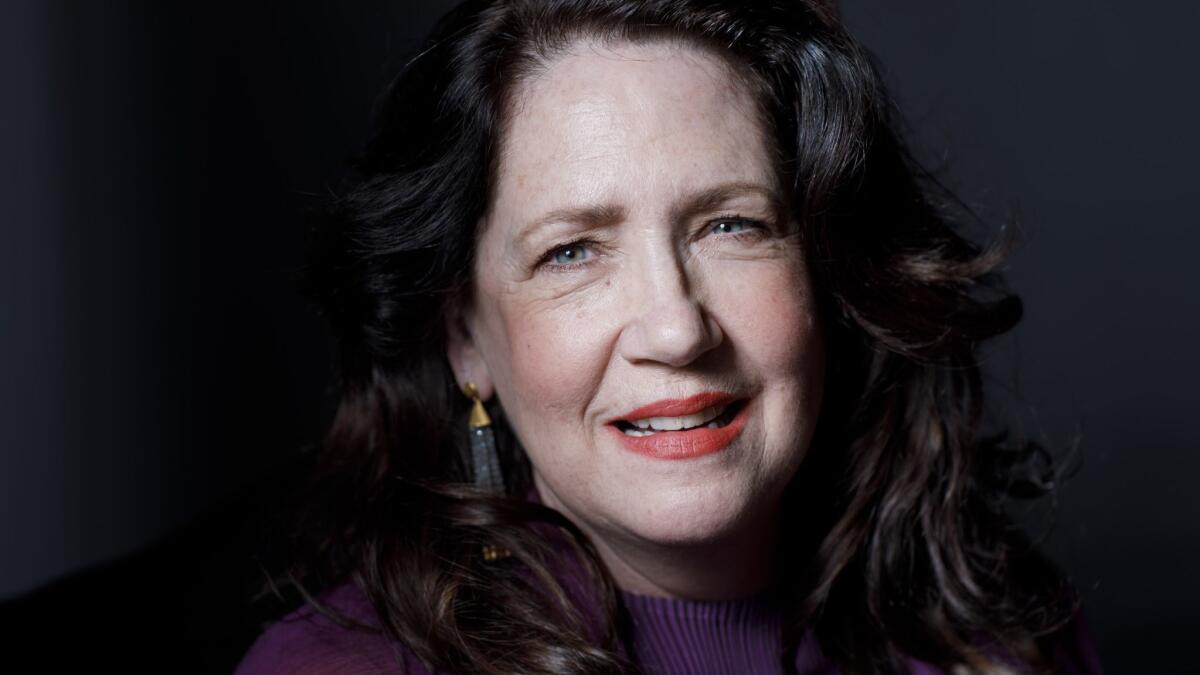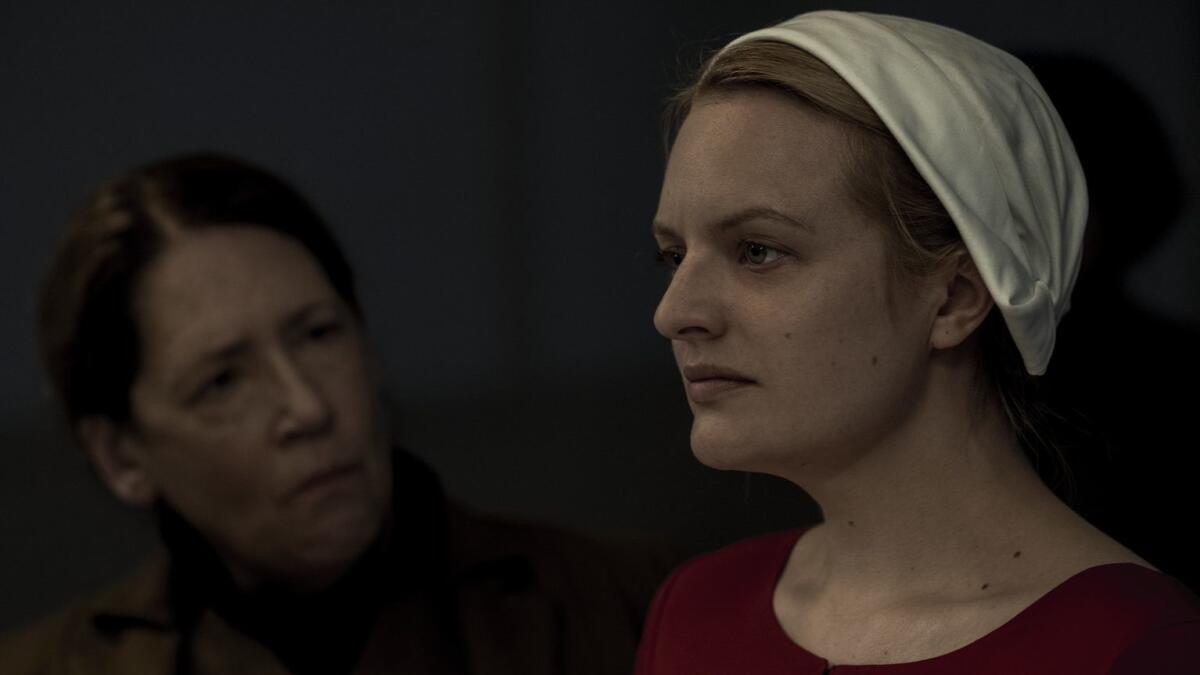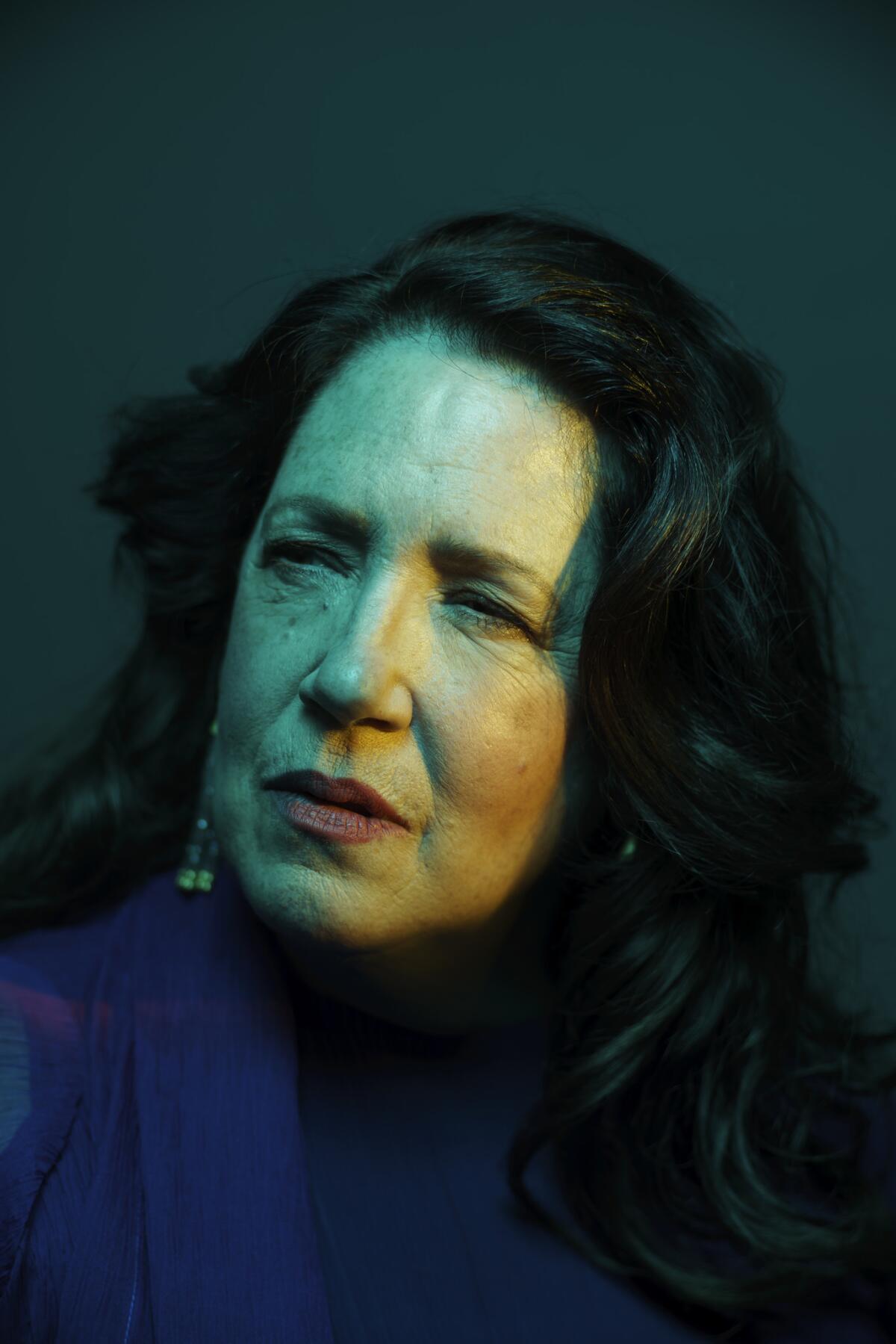Ann Dowd follows her own path to success in ‘The Handmaid’s Tale’

- Share via
When Ann Dowd is walking toward you, the impulse is not to make eye contact.
The veteran actress has played, with chilling effect, some of television’s most fearsome, scene-stealing archvillains in recent years: cult leader Patti Levin in HBO’s recently departed “The Leftovers” and, currently, the domineering oppressor Aunt Lydia in Hulu’s “The Handmaid’s Tale.”
But Dowd, draped in an imperial violaceous dress, is far more friendly than intimidating during a recent sit-down. Unlike her alter egos, she’s not stingy with a laugh.
And there’s much to be happy about. In addition to Season 2 of “The Handmaid’s Tale,” which is currently available to stream, Dowd has a string of films opening next month, including horror film “Hereditary” and “A Kid Like Jake,” opposite Claire Danes and Jim Parsons.
But it’s Dowd’s dark character on “The Handmaid’s Tale” — for which she won an Emmy last year — that has everyone talking these days. And not simply because of her performance. A few weeks from this conversation, the character got caught up in controversy after comedian Michelle Wolf compared divisive White House Press Secretary Sarah Huckabee Sanders to Aunt Lydia, sparking countless dissections.
(Dowd gave us her thoughts on the hubbub via email, as noted below.)
Aunt Lydia is a very complicated character. Two seasons in, what has it been like getting to know her?
It's like a friendship or a relationship: She tells me about her, I tell her about me. I think that whatever happens to her, whoever hurt her, did it very successfully. And I think it was early and consistent. So, at some point, the doors closed and what remains is this. She has managed to, from her perspective, live a redeemed and meaningful life.
The world is trashed. I think she had a very religious upbringing. She's a loner, very repressive. And maybe she had a baby early, had sex, or something and was shamed — shamed into submission and begging God for just one more chance.
So, I think she's a purist in the sense that she said, "This has got to change."

You're coming into this role after playing Patti in “The Leftovers.” They're both such chilling characters. Where do you go, what do you channel, when bringing them to life?
I must be a twisted soul deep down, but I loved Patti from minute one. And I never looked at her as the enemy, ever. Here's another woman trashed all her life, never had a minute of anything. And then she's validated, and for the first time in her life, comes into her strength. She's a born leader who is like, “It's over, baby. It's done. Let's let go of attachment. Let's stop this.” She makes so much sense to me.
And Lydia, I get it. I was educated by Catholic nuns. They were not cruel. I never went through any of that. My two aunts were Catholic sisters. I know that world and what I got from it. Being educated by Catholic sisters was a sense of work ethic — the whole, “You're not special, hon. You have a job to do, and when it is completed, then you may go about your next thing.” So, that sense of commitment, discipline, work ethic, respect for your elders, deferring to authority. That was all firmly implanted.
You won my heart when you revealed that you didn’t understand “The Leftovers” when you first read the script.
Not only did I not understand, I said, on the phone to my manager and agent, "What is with this departure business?" My manager and agent were quiet, like we have an idiot client. But they didn't go there. They said, "Well, it's an HBO show shooting in New York. Why don't you give it another read?" I thought, "Eh."
Then, I went in the room and something happened. I went in the room and I said, "Oh, wait. She's interesting." But she doesn’t say anything. And I thought, “Oh, great. She's not gonna talk?” Oh, how I was wrong. Not talking is the most powerful position you can have in a room. The things I learned on that show — I can’t even tell you. Imagine spending time in some town up in New York somewhere, and there’s Liv Tyler, and she’s on her goat cheese fast, and Amy Brenneman. And we’re all sitting around, we’re dead tired and we’re getting to know each other. And we’re laughing and we’re saying, “OK, Liv, your skin is flawless, stop with the goat cheese.”
What has it been like to receive this kind of acclaim at this stage in your career? How are you able to process it or enjoy it in ways maybe you couldn’t had it come sooner?
It would have been a very hard thing. I would say the first two-thirds of my career, if you will, were about letting go of fear and letting go of control. I hope this doesn’t sound like bragging — I don’t mean it that way, but I played a character that I loved deeply, and it was one of the first things I did out of school — her name was Sarah in a play called “A Different Moon” by Ara Watson. I didn’t read reviews, I don’t read them now. But I was told about one that said, “Who is Ann Dowd and where will she go from here?” And I almost collapsed with pressure. And so that this would happen now, when I could focus on the work — these women that made sense to me, to be able to play loners who just follow a different path — it has been a blessing.

Were you able to be present in that moment when you were onstage accepting your Emmy?
I’ll never get over it for as long as I live. It makes me cry to think about it, because as much as you think, “I’m not going to attach my worth to it,” it does mean something. When this moment happens in your life, when someone says, “You did good, here you go”—it’s unbelievable. You wish that for everybody — [whether] they’re doing something that matters to them, or even [if] they’re not doing something that matters to them, but they’re doing it because they don’t have an option. Like, I’m doing a film in Valencia and I’m staying at like a Hilton Garden Inn. And you see the workers who are getting the towels and cleaning rooms and moving down that hallway and they’re behind schedule so they’re trying their hardest to hurry. If someone just said, “Hey, could you come here for one second? I’m going to put this light on you and everybody’s is going to see you and praise your work.” Can you imagine what that does to someone’s spirit? Acknowledgment can go a long way to someone’s insides.
Before becoming an actress, you were pre-med. What happened there?
I had decided I wanted to be a doctor. It was a decision I sort of made for my dad. And then he died, which was catastrophic to my life. But yes, he had wanted me to go to [the College of the] Holy Cross, his alma mater. I didn’t want to go. We were at odds a lot — but the love was never a question. I loved my dad deeply. But yes, I wanted to carve my own path. I wanted to go to summer theater, because plays were heaven to me. He was very supportive of that. And I had gotten the part of Adelaide in “Guys and Dolls.” And I was thrilled and was about to tell them when life happened. I got home and my mother was sitting next to my sister and they were crying. They said my dad had two to five years to live. I went upstairs and had a good cry … then I went into his office and I said: “I have three things to tell you: I’m going to Holy Cross, I’m not going to summer theater, and I’m sorry for all the grief I caused you, and I love you and can I give you these things?” I’m so lucky, because if you don’t get that chance, you live with that regret. I went off to Holy Cross in the fall. He died in March. I was really committed to that decision. And it’s a rough, rough college experience. The anxiety is over the top. But relief came in acting classes and doing plays at the same time. And it’s led me here.
Aunt Lydia has been in the news lately. What were your thoughts on the White House press secretary being compared to your character during Michelle Wolf’s set at the White House Correspondents’ dinner?
(Via email) From my experience, Lydia is a straightforward person with a low tolerance for confusion and nonsense. Had she been offered the job of press secretary for the present administration, she most likely would have turned it down. Also, Lydia has the comfort of believing that everything she says and does is in service to God. Ms. Sanders has no such luxury.
Overtime: What are you reading now?
I'm reading the novel “Lambs of God” in preparation for the miniseries of the same name that began shooting this week in Sydney, Australia. The novel is written by Marele Day and the screen adaptation is by Sarah Lambert. It's a wonderful story about three cloistered nuns who live in a huge monastery taken over by nature on a remote island somewhere off the coast between England and Ireland. After 12 years of no visitors, a priest arrives, sent by the bishop, with plans for the monastery. Suffice it to say, the nuns take matters into their own hands.
Twitter: @villarrealy
The complete guide to home viewing
Get Screen Gab for everything about the TV shows and streaming movies everyone’s talking about.
You may occasionally receive promotional content from the Los Angeles Times.




